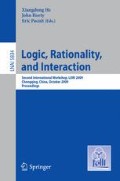Abstract
Formal learning theory formalizes the phenomenon of language acquisition. The theory focuses on various properties of the process of conjecture-change over time, and therefore it is also applicable in philosophy of science, where it can be interpreted as a theory of empirical inquiry. Treating “conjectures” as beliefs, we link the process of conjecture-change to doxastic update. Using this approach, we reconstruct and analyze the temporal aspect of learning in the context of temporal and dynamic logics of belief change. We provide a translation of learning scenarios into the domain of dynamic doxastic epistemic logic. Then, we express the problem of finite identifiability as a problem of epistemic temporal logic model checking. Furthermore, we prove a doxastic epistemic temporal logic representation result corresponding to an important theorem from learning theory, that characterizes identifiability in the limit, namely Angluin’s theorem. In the end we discuss consequences and possible extensions of our work.
Access this chapter
Tax calculation will be finalised at checkout
Purchases are for personal use only
Preview
Unable to display preview. Download preview PDF.
References
Angluin, D.: Inductive inference of formal languages from positive data. Information and Control 45(2), 117–135 (1980)
Baltag, A., Moss, L.S., Solecki, S.: The logic of public announcements, common knowledge, and private suspicions. In: Proc. TARK 1998, pp. 43–56 (1998)
Baltag, A., Smets, S.: Dynamic belief revision over multi-agent plausibility models. In: Bonanno, G., et al. (eds.) Proc. LOFT 2006, pp. 11–24 (2006)
van Benthem, J., Gerbrandy, J., Hoshi, T., Pacuit, E.: Merging frameworks for interaction. Journal of Philosophical Logic (2009)
Fagin, R., Halpern, J.Y., Moses, Y., Vardi, M.Y.: Reasoning About Knowledge. MIT Press, Cambridge (1995)
Gierasimczuk, N.: Bridging learning theory and dynamic epistemic logic. Synthese 169(2), 371–384 (2009)
Gold, E.: Language identification in the limit. Information and Control 10, 447–474 (1967)
Lange, S., Wiehagen, R., Zeugmann, T.: Learning by erasing. In: Arikawa, S., Sharma, A.K. (eds.) ALT 1996. LNCS (LNAI), vol. 1160, pp. 228–241. Springer, Heidelberg (1996)
Mukouchi, Y.: Characterization of finite identification. In: Jantke, K.P. (ed.) AII 1992. LNCS, vol. 642, pp. 260–267. Springer, Heidelberg (1992)
Parikh, R., Ramanujam, R.: A knowledge based semantics of messages. Journal of Logic, Language and Information 12(4), 453–467 (2003)
van der Meyden, R., Wong, K.-s.: Complete axiomatizations for reasoning about knowledge and branching time. Studia Logica 75(1), 93–123 (2003)
Author information
Authors and Affiliations
Editor information
Editors and Affiliations
Rights and permissions
Copyright information
© 2009 Springer-Verlag Berlin Heidelberg
About this paper
Cite this paper
Dégremont, C., Gierasimczuk, N. (2009). Can Doxastic Agents Learn? On the Temporal Structure of Learning. In: He, X., Horty, J., Pacuit, E. (eds) Logic, Rationality, and Interaction. LORI 2009. Lecture Notes in Computer Science(), vol 5834. Springer, Berlin, Heidelberg. https://doi.org/10.1007/978-3-642-04893-7_8
Download citation
DOI: https://doi.org/10.1007/978-3-642-04893-7_8
Publisher Name: Springer, Berlin, Heidelberg
Print ISBN: 978-3-642-04892-0
Online ISBN: 978-3-642-04893-7
eBook Packages: Computer ScienceComputer Science (R0)

